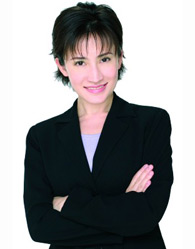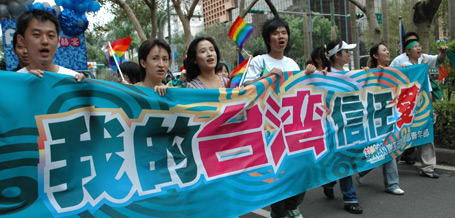Former Democratic Progressive Party (DPP) legislator Hsiao Bi-Khim (蕭美琴) has been one of the most vocal supporters for gay rights within Taiwan's political arena, authoring a well-publicised proposal to legalise same-sex marriage in the territory.

Former Democratic Progressive Party (DPP) legislator Hsiao Bi-Khim in 2006 sponsored a same-sex marriage bill to be put on the assembly's agenda but was blocked by 23 lawmakers. Top of page: Hsiao (second from left) marching at the Taiwan Pride Parade on Oct 13.
She became an Advisor to President Shui-bian in 2000 and was involved in President Chen's 2000 and 2004 election campaign as a spokesperson and international affairs director. She is notably one of the youngest congresswomen in the Taiwanese parliament when she entered the legislature in 2002 at the age of 31.
In 2006, Hsiao sponsored a same-sex marriage bill to be put on the assembly's agenda but was blocked by 23 lawmakers led by Kuomintang Legislator Lai Shyh-bao who filed a joint petition.
Fridae's Taipei correspondent Philip Hwang spoke to Hsiao about the bill she sponsored in 2006, the limitations of legislators and why the LGBT community needs to play its part in affecting legal change just before she ended her last term in office last week.
æ: Can you briefly recount for us your proposal to legalise same-sex marriage and both its consequences and repercussions?
Bi-Khim: Well, our proposal passed initially, but only because the opposition failed to spot it. When they did however, they produced a counter bill, locking it so it's not even in the review process, and then preceded to swarm me - and others who signed the bill - with phone calls and emails. Two of my colleagues who were also Presbyterian ministers were under particular pressure, and while no one who signed the bill backed out, we were unable to put it on the agenda.
I then held follow-up sessions with various gay rights organisations, and while we had several options - continuing pushing the bill knowing it won't go anywhere, present a modified bill pushing for same-sex partnership instead, or have another hearing - there was no clear consensus. I actually asked the main legislator behind the opposition, Lai Shi-Bao, why he's doing this, and while he said that his values dictate that same sex marriage is wrong, I also think he had support from conservative religious groups. In fact, I think they even held a prayer session to condemn me!
I made it clear then, that we're limited in the number of staff we have to draft a new bill. If the gay community wants to present a new bill, I'd be happy to sponsor it, but we ourselves are at capacity. I feel that the gay community needs to get their act together and take the initiative - they can't just rely on well-intentioned outsiders to do their work for them. I'm sure there are lawyers and professionals in the LGBT community who can and should come up with a new bill so that we can sponsor it; but it doesn't seem that they've progressed on that.
æ: How has working with the LGBT community been then? Have you made clear to them what you have just reflected, e.g., that they need to put in an equivalent effort?
Bi-Khim: I made that very clear. For example, in my work to push animal protection laws, we've done the same hearings and such, but the groups I worked with were very specific. They were able to say, "This is what we want," even providing their own ideal version of the bill and specifying how best to change the current one. We got a lot of input and made a lot of changes together, and it worked.
But with same sex marriage, some people want this, and some people want that, yet nobody gave me an ideal version of what they want. I'm willing to be supportive, but if the community has no interest in promoting it, then why should I stick my head out and be called the devil when I'm not even gay or lesbian?
Once again, I'm willing to be supportive but I think this is what political action is about: if you feel it's an important issue, you have to back it up with some action. I think I've done my part coordinating public hearings and meetings with various organisations. I've also made it clear that if there's a new bill I'm willing to sponsor it and have my head smashed or whatever - but it has to be a dynamic process.
æ: Last October, of course, saw record attendance at Taipei's own gay pride parade. Can you comment on that?
Bi-Khim: I think it's good that it's getting larger and larger - it shows that our society is getting a lot more tolerant. I think the large numbers also reminds others who are not out yet that they are not alone, so I think it's more than a party: it serves an important sociopolitical purpose.
æ: While both of the nation's main political parties - the KMT and DPP - were present during this year's parade, election promises made to the LGBT community are seldom met. How do you suggest we change that?
Bi-Khim: Firstly, I think there has already been incremental change at the top. President Chen is the first president to meet international LGBT leaders in his official guest reception hall as foreign dignitaries; I don't think G.W. Bush would do that. Actual change, however, has two dimensions. One is the public's social psychology, which requires education and gender-sensitive media. The other is political, where we've made some progress, for example, on domestic violence, where we've incorporated the protection of same-sex partners.
Of course, there are other areas where we hope to make progress but have met obstacles, in which case I think party leaders should do something. I've asked Lai Shi-Bao why he's blocking my proposed bill when his boss, party leader, former mayor of Taipei and current opposition presidential candidate Ma Ying-Jeou, is pro-gay. I think that if Ma really wants to be supportive, he should talk to his followers, but we haven't seen that happening. Of course, there are people in my party who are prejudiced and have made insensitive remarks, but my party headquarters have come out to counter those statements.
On the social side, we've passed the Gender Equality Education Act, whose name we insisted on instead of "Man-and-Woman Education Equality Act." Even on that however, people were opposed to the name; they felt that "gender equality" would also include transsexuals or whatever.
I think Taiwan as a society is overall more tolerant than other Asian communities, and I'm proud to say that the same excitement you see here at the parade you won't see in more conservative Asian countries. When I talked to my Japanese colleagues, letting them know that I've authored a same-sex marriage bill, they were like, "Oh my god, how can you do that?" It's incomprehensible for them.
æ: How would you compare the gay rights movement in Taiwan to that in other countries? What are some similar or different challenges that we face?
Bi-Khim: Compared to Europe, of course, we are far behind. There, you have gay people in important political offices. Our sister party in Germany, for example, has a gay chairman, and they're certainly a lot more tolerant. In fact, I don't think I've heard of any openly gay politician in office right now.
æ: I think someone ran a few years back for office but didn't get electedģ
Bi-Khim: Exactly. If you want politicians to support gay rights, then the community must come out to get them elected to act on their behalf. It's the same in gaining political awareness: there needs to be greater interest and belief that the community can be organised in order to be visible. The parade, for example, is a great way to get that attention.
æ: A recent issue that is of importance to Taiwan's LGBT community has been the issue of police "fishing," something that amounts in the west to entrapment. How is that even possible these days?
Bi-Khim: In all honesty, the police have better things to do (laughs). Once again, I think that you need to exert pressure for issues important to you to be taken seriously, but even on the definition of pornography, for example, we're a lot more tolerant than surrounding countries. With Ang Lee, for example - and I think this goes beyond the fact that he's Taiwanese - the fact that we can air films of his without them being censored at all is amazing compared to China, Singapore, or other countries.
Once again however, to make legal change, you need legal representation. Of the four people who co-signed the bill, I think at least three of us are already out of the game. If the LGBT community doesn't feel it's important enough to form a political action group, then there won't be anyone to advocate for them. I think it's a problem in Taiwan that people think politics are dirty, but if you don't do it, you don't have the ability to effect change.
æ: How would you analyse the political climate in terms of gay rights? Will the upcoming presidential elections in March change anything?
Bi-Khim: First of all, both political parties were at parade, which I think is great. I think that whoever is elected will follow a trend towards a tolerant political atmosphere.
By the way, I don't want to sound I'm complaining, because LGBT community leaders have held a press conference to support my primaries and I really appreciate it - it's not like there's no action at all!
æ: On a more personal note, what formulated your stance and view on gay rights?
Bi-Khim: I think I'm just more liberal in general. I come from a liberal educational background, having attended Oberlin College (Ohio, US), where people generally marginalised actually have a strong presence and voice. I think that that was an important educational opportunity to appreciate and understand diversity.
æ: Do you intend to stay in politics in other capacities? What are your future plans?
Bi-Khim: No, I expect to take a serious break from this and I think I deserve that! I will do some traveling and just relax, maybe in Latin America, where I'll get myself a Latin novio - a Ricky Martin type! (laughs) You know, when I was a teenager I used to have the biggest crush on George Michael. He was like my guy, and when he came out, I guessed that I'll never get the chance!
æ: George Michael and Ricky Martinģ?
Bi-Khim: Well, as I've said before, I appreciate diversity!

